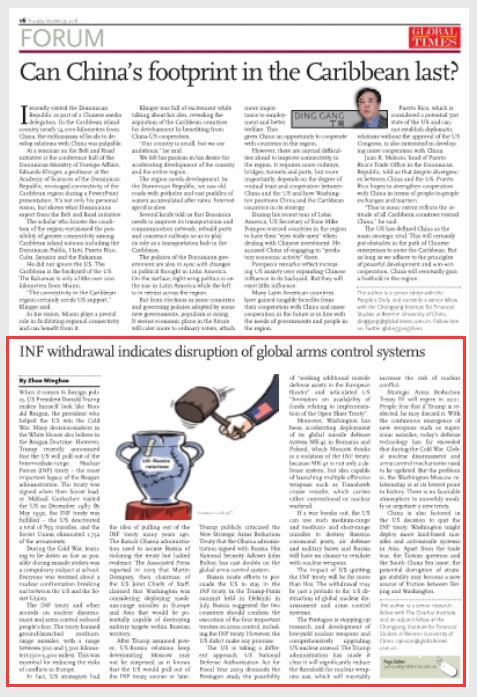Major Power Relations
Your Present Location: PROGRAMS> Major Power RelationsZhao Minghao: INF withdrawal indicates disruption of global arms control systems
By Zhao Minghao Sourec: Global Times Published: 2018-10-24
When it comes to foreign policy, US President Donald Trump makes himself look like Ronald Reagan, the president who helped the US win the Cold War. Many decision-makers in the White House also believe in the Reagan Doctrine. However, Trump recently announced that the US will pull out of the Intermediate-range Nuclear Forces (INF) treaty - the most important legacy of the Reagan administration. The treaty was signed when then Soviet leader Mikhail Gorbachev visited the US in December 1987. By May 1991, the INF treaty was fulfilled - the US deactivated a total of 859 missiles, and the Soviet Union eliminated 1,752 of the armaments.

During the Cold War, learning to lie down as fast as possible during missile strikes was a compulsory subject at school. Everyone was worried about a nuclear confrontation breaking out between the US and the Soviet Union.
The INF treaty and other accords on nuclear disarmament and arms control reduced people's fear. The treaty banned ground-launched medium-range missiles, with a range between 500 and 5,500 kilometers (310-3,400 miles). This was essential for reducing the risks of conflicts in Europe.
In fact, US strategists had the idea of pulling out of the INF treaty many years ago. The Barack Obama administration used to accuse Russia of violating the treaty but lacked evidence. The Associated Press reported in 2015 that Martin Dempsey, then chairman of the US Joint Chiefs of Staff, claimed that Washington was considering deploying medium-range missiles in Europe and Asia that would be potentially capable of destroying military targets within Russian territory.
After Trump assumed power, US-Russia relations keep deteriorating. Moscow may not be surprised as it knows that the US would pull out of the INF treaty sooner or later. Trump publicly criticized the New Strategic Arms Reduction Treaty that the Obama administration signed with Russia. His National Security Adviser John Bolton has cast doubts on the global arms control system.
Russia made efforts to persuade the US to stay in the INF treaty. In the Trump-Putin summit held in Helsinki in July, Russia suggested the two countries should confirm the execution of the four important treaties on arms control, including the INF treaty. However, the US didn't make any promise.
The US is taking a different approach. US National Defense Authorization Act for Fiscal Year 2019 demands the Pentagon study the possibility of "seeking additional missile defense assets in the European theater" and articulated US "limitation on availability of funds relating to implementation of the Open Skies Treaty".
Moreover, Washington has been accelerating deployment of its global missile defense system MK-41 in Romania and Poland, which Moscow thinks is a violation of the INF treaty, because MK-41 is not only a defense system, but also capable of launching multiple offensive weapons such as Tomahawk cruise missile, which carries either conventional or nuclear warhead.
If a war breaks out, the US can use such medium-range and medium- and short-range missiles to destroy Russian command posts, air defense and military bases and Russia will have no chance to retaliate with nuclear weapons.
The impact of US quitting the INF treaty will be far more than this. The withdrawal may be just a prelude to the US destruction of global nuclear disarmament and arms control systems.
The Pentagon is stepping up research and development of low-yield nuclear weapons and comprehensively upgrading US nuclear arsenal. The Trump administration has made it clear it will significantly reduce the threshold for nuclear weapons use, which will inevitably increase the risk of nuclear conflict.
Strategic Arms Reduction Treaty III will expire in 2021. People fear that if Trump is re-elected, he may discard it. With the continuous emergence of new weapons such as supersonic missiles, today's defense technology has far exceeded that during the Cold War. Global nuclear disarmament and arms control mechanisms need to be updated. But the problem is, the Washington-Moscow relationship is at its lowest point in history. There is no favorable atmosphere to smoothly modify or negotiate a new treaty.
China is also factored in the US decision to quit the INF treaty. Washington might deploy more land-based missiles and anti-missile systems in Asia. Apart from the trade war, the Taiwan question and the South China Sea issue, the potential disruption of strategic stability may become a new source of friction between Beijing and Washington.
The author is a visiting fellow with the Chongyang Institute for Financial Studies under the Renmin University of China.























































































 京公网安备 11010802037854号
京公网安备 11010802037854号





